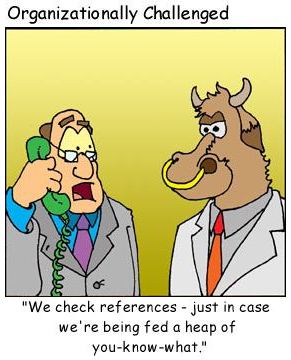
When did he/she work for your company?
Could you confirm starting and ending employment dates? When did s/he leave the company?
Why did he/she leave the company?
What was her/his starting and ending salary?
What was her/his position? Can you describe the job responsibilities?
Could I briefly review his/her resume?
Does the job title and job description match the position that he/she held?
Did he/she miss a lot of work? Was s/he frequently late?
Were there any issues you are aware of that impacted her/his job performance?
Did s/he get along well with management and co-workers?
Was he/she promoted while with your company?
Did he/she supervise other employees? How effectively? If I spoke to those employees, how do you think they would describe his/her) management style?
How did he/she handle conflict? How about pressure? Stress?
Did you evalute his/her) performance? Can you speak to his/her strong and weak points? What was noted as needing improvement during this performance review?
What was his/her) biggest accomplishment while working for your company?
Would you rehire he/sheif the opportunity arose?
If I describe the position we are hiring for to you, could you describe how good a fit you think he/shewould be for the position?
Can you describe this person's experience working as a member of a team?
Is there anything I haven't asked that you would like to share with me?
What was his/her period of employment?
Please outline his/her position and responsibilities?
Reviewing his/her resume, does this job title and job description match the position that the candidate held?
What was his/her reporting structure?
If his/her did not report to you, what was your working relationship?
How long have your worked with /known his/her?
What was his/her reason for leaving your company?
Can you tell me his/her salary at the time of leaving?
How would you describe his/her punctuality?
Could you rate his/her reliability?
How would you describe his/her honesty and integrity?
How did his/her get along with co-workers and management?
If his/her supervised/managed any employees, how would you describe her/his supervisory/management skills?
Describe his/her ability to handle pressure? Can you give me an example?
Ability to organize, prioritize and manage time?
Ability to handle conflict?
Ability to work as a team member?
How would you rate his/her communication skills?
Please describe his/her work ethic?
Please describe the quality of his/her work?
What do you consider his/her key strengths?
What would you consider to be his/her areas for improvement?
What would you say was his/her biggest accomplishment while working at your company?
How would you rate his/her overall job performance?
Was his/her ever promoted while working at your company?
His/her is being considered for the following position, do you think he/she is a good fit?.
Theoretically, would you re-employ him/her?
Is there anything else you would like to add about his/her?
